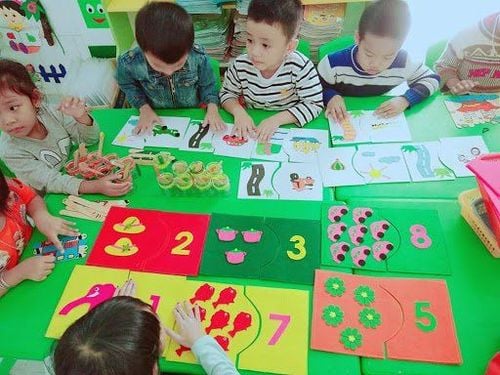This is an automatically translated article.
Promoting the development of your child is something that parents always want to do everything possible to help their child thrive in life. Infant development experts believe that a child's early years are an important time for learning, but it can sometimes be difficult to think of ways to help your baby develop effectively. In this article we provide helpful information on what parents and caregivers need to do to help their baby grow.1. Bathe your baby with maximum love and care
Scientific evidence shows that love, care and affection during the first few years of life have a direct and measurable impact on a child's physical, mental, and emotional development. . Experts say a parent's love and care also helps a baby's brain develop.How do you show your love to your children? Constantly hugging, touching, smiling, encouraging, listening, and playing and talking with your baby are the best ways parents can show their love.
It's also important to find out what causes your baby's crying, especially during the first 6 months, when experts say it's impossible to spoil your baby. Be attentive to your baby's immediate physical needs and need to be sensitive to things like your baby's body temperature or how uncomfortable a wet diaper is. According to Zero to Three, a nonprofit dedicated to improving the lives of babies, toddlers, and families, parenting feedback when babies are sad (as well as when they're happy) can Helps build trust and strong emotional relationships.

Các chuyên gia cho biết tình yêu và sự quan tâm của cha mẹ giúp não bộ của bé phát triển
2. Basic child care
Children need to be healthy so they can learn and grow. Take your child for regular health check-ups and always pay attention to make sure that he or she is fully vaccinated with all the necessary vaccines. In addition, sleep is also very important for children, so help your baby get the most comfortable rest. Your baby's brain cells make important connections during sleep, helping with learning, movement and thinking. These connections help babies understand what they see, hear, taste, touch and smell... as they explore the world.Breast milk and formula provide all the nutrients a baby needs for the first six months and make up a large part of a baby's diet until at least after the baby's first birthday. Studies show that breastfed babies have lower rates of allergies, diarrhea, breathing problems, overweight and obesity, and ear infections. But if babies cannot breastfeed, they can still develop normally with formula.
3. Talking to children
Many studies have shown that children whose parents talk a lot can develop more advanced language skills than children who do not receive much verbal stimulation. (Many experts even suggest that talking to your baby while he's still in the womb is a great way to start bonding.)Talk to your baby while you're swaddling, feeding, and bathing. little. Children will react better if they know your words are being directed at them, so try to look at them while they're speaking. Don't worry about saying anything because the reality is that your child still doesn't understand. Just describe what you're doing like, "I'm putting warm water in the tub to wash you." Parents should talk to their baby naturally, speaking in simplified sentences and phrases in a high voice. Experts say this helps young children learn language, but use voice often as children get older to help them develop good language skills.
4. Read to your baby
Pay attention to reading to your child from day one. Reading aloud is one of the most important things parents can do to build their child's vocabulary, stimulate their imagination, and improve their child's language and social skills. It's just another good reason to show affection towards your children. Print books for babies should be chosen as they may find animations, sound effects in digital books or reading apps distracting them.
Hãy chú ý đến việc đọc sách cho trẻ nghe ngay từ ngày đầu tiên
5. Stimulate your baby's senses
Children need to be exposed to different people, places and things to learn about everything. Each new interaction provides the child with information about the world and his or her place in it. Even the simplest daily activities can stimulate your baby's development. Teaching your child to play interactive games, go for walks and go shopping together and meet new friends is a great way to stimulate your baby's senses.Choose toys and objects with different shapes, textures, colors, sounds and weights. Turn on your favorite music during playtime or sing traditional lullabies as you put your baby to sleep. Provide a safe space where children can comfortably crawl, walk, and eventually walk without constantly hearing "no" or "don't touch" sounds from their parents. For example, put child-proof locks on all cabinets in the kitchen, except for one. Fill that drawer with plastic bowls, measuring cups, wooden spoons and pots and pans that your baby can safely play with. If kids get excited seeing grandpa or grandma's face on online video calling apps, let them practice their conversation skills through video chat.
However, children are also very easily overstimulated, so there is no need to interact with them 24 hours a day or try to engage all of their senses at once. In addition, doctors do not encourage children under 18 months of age to watch TV or use smartphones, even with the TV on in the background.
6. Set challenges for children
When an activity is not easy for the child to do, parents have to find a new way to complete the task. Don't frustrate your child with toys or activities that are beyond her ability, but give her the opportunity to take on new challenges that help her master her skills.For example, if your child is trying to open a box, do not open it for him, but let him try it first. If the child continues to have difficulty, show him how to open the box, then return the child a closed box so he can try again on his own.
7. Take care of yourself
It is a fact that happy parents raise happy children, so make sure to take care of yourself. Exercise every day, eat healthy foods, and get enough sleep to keep your body in tip-top shape. In addition, mothers should also find ways to share family and parenting responsibilities with their partners. And if you're a single mom, make sure there's always someone around to help youDon't forget to take some time for yourself. Being a parent, especially with hyperactive kids, is exhausting and young parents also need time to recharge. If you're too worried about babysitting or feeling depressed, find someone you trust to talk to. Most women experience some negative emotions after giving birth, but they may experience depression if:
Feeling intense sadness or anxiety. Unable to care for herself or her child. I no longer like what I usually do. Any of these situations are signs of depression and need to be examined, diagnosed, and treated promptly.

Đừng làm trẻ cảm thấy thất vọng với những hoạt động vượt quá khả năng của bé
8. Find a good babysitting place
If parents are too busy with work or need a regular babysitter, a quality babysitting provider is essential for the healthy development of the baby. Whether your caregiver is a nanny, relative or child care worker, she must be experienced, conscientious and reputable, with a sincere love for children and the drive to help. children develop.A child's parents don't have to be child development experts to give their child a great start in life. Scientific studies have proven that: Love, care and basic care and a few other simple steps are all that children need and want to be able to develop to the fullest. both physically and mentally.
Besides, parents also need to supplement their children with essential micro-minerals such as zinc, lysine, chromium, selenium, vitamin B1, ... to fully meet the nutritional needs of children. The addition of these essential vitamins also supports digestion, enhances nutrient absorption, improves anorexia, and helps children eat well. Parents can simultaneously apply dietary supplements and functional foods derived from nature for easy absorption. The most important thing is that improving your baby's symptoms often takes a long time. Combining many types of functional foods at the same time or changing many types in a short time can make the baby's digestive system unable to adapt and completely not good. Therefore, parents must be really patient with their children and regularly visit the website vimec.com to update useful baby care information.
Reference source: babycenter.com, everydayhealth.com













